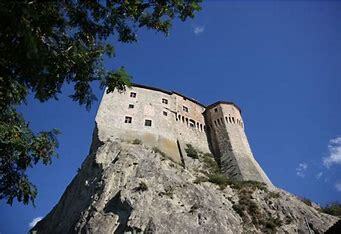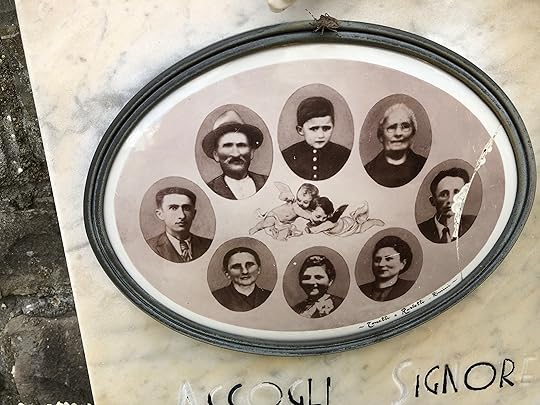History with mystery …
The Lost Garden, out on September 11th, is a little different from my other World War Two historical fiction novels. I’d describe it as history with mystery and a lacing of supernatural.

The principal setting is based on a town near to me, over the border from Tuscany and into Romagna, half an hour’s car drive from where I live each summer. Perched above the town of Sant’Agata Feltria is the most exquisite ancient castle, dating from the thirteenth century, presenting itself as the perfect illustration for a children’s fairy tale. In fact my son-in-law, who is great at drawing, keeps urging me to write a story so he can illustrate it. Instead, I have imagined another Second World War situation. And stretched the truth to an extent, because the local tourist office has been unable to furnish me with history of that time. The castle is set a little way back from the valley that saw so much fighting near the Gothic Line and although it commands a superior position, as far as I can find out, it never was used as a defensive position. If you visit the castle of Sant’Agata Feltria today, (renamed in The Lost Garden as Sant’Agnese), you will wander around a building that has been turned into an exhibition of fairy tales. So, I invented my own history.






All wars are tragic. Small wonder people cling to their religious beliefs and superstitions and need to hold on to the thought of an afterlife: to give reason and hope to their own lives. I have never experienced any ghostly apparitions but I know friends who have and my own very down-to-earth mother was very aware of an evil presence in her first home immediately after the war. She didn’t tell my father as she felt foolish but when he was away for work, she moved out of the double room and slept on the floor next to my brother’s cot as she felt so ill at ease in their double room. My father in the meantime had been told in his local pub about a grisly murder committed in that very room, the body only discovered a while later, wrapped in a carpet. He didn’t tell my mother until they had moved from their cottage.
The spirit in The Lost Garden is not evil. Fiammetta is a restless benevolent being, concerned to ensure her daughter, Tina, lives a fulfilled life. While I wrote, I hoped readers would not think I was potty. Make of her what you will… but I absolutely needed her in my story.
Reviews so far have thankfully been favourable and I am so grateful.
“The story has supernatural elements which enhance the intrigue and mystery.”
“A new book from Angela Petch is always a treat, and this one is no exception. For the first time she dabbles in the ghostly, which adds an extra dimension to the story.”
“… it was a pleasure to be in Angela’s story, the world she created for us within her story was spellbinding and beautiful…”
“The Lost Garden is a novel that sneaks up on you. It doesn’t shout. It doesn’t rush. But it gets under your skin. It has a ghostly beauty to it—a quiet whisper of the past, a touch of the otherworldly, and a whole lot of heart.”
Whoever you are, you reviewers, thank you so much. xxx baci, as we say in Italian.
A line in one review stood out for me: “This is almost a fairy tale except that WWII is out there.”
Yes, indeed! I have included details which took place very close to the castle, just along the valley from Sant’Agata Feltria. The massacre that I describe in Sant’Agnese is based on the dreadful massacre at Fragheto. I have skewered facts into my own story but there were too many outrageous atrocities committed in our area of eastern Tuscany.
A local museum in the village of Casteldelci, near Sant’Agata, features this massacre and it makes for a sobering visit. I was drawn to tears.



The phrase in the middle caption translates: “We are the memory that we own and the responsibility that we assume”. In simple words, we should #neverforget
The Fragheto massacre was the massacre of 30 Italian civilians and 15 partisans in Fragheto, on 7th April 1944, by soldiers of the German 356th Infantry Division. After partisans belonging to the Eighth Garibaldi Brigade ambushed troops approaching the hamlet, fourteen soldiers of the Sturm-battaillon OB Sudwest conducted house-to-house searches and summarily killed civilians. Many of the victims were elderly people, women, or children. A further seven partisans and one civilian were shot the next day at Ponte Carrattoni, spanning the Marecchia river, now known as the bridge of the eight martyrs. I have referenced the bridge in The Lost Garden. But of course the names in my book are not those on the photo above: the oldest victim, 78, the youngest 40 days old. What harm could they possibly have done? Man can be so cruel.
So, although I have invented a story, it is influenced by fact and politics of the time. We should never forget the sufferings of ordinary people but we never seem to learn about war, do we? Witness today…
Some Netgalley reviewers have the same views: “This is a story of suffering and loss, but also of strength and determination. An excellent read, and a stark warning for our own times.”
“A beautiful story of devastation, heartbreak and love even though at times very confronting and sad.”
“What elevates The Lost Garden is its emotional intelligence. Petch doesn’t just show us what war does to a country—she shows us what it does to families, to friendships, to memory. She’s not afraid to let things unfold gently, giving the reader time to sit with each choice, each consequence. And that patience pays off. When the emotional hits land, they land hard. I found myself unexpectedly teary more than once, not because of some dramatic reveal, but because of a quiet line or a simple act of love in the middle of chaos.”
I am overwhelmed by the reactions so far and I hope my book will please new readers too.



